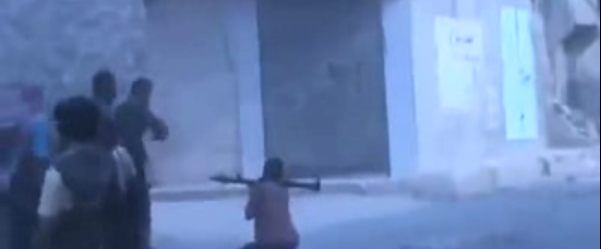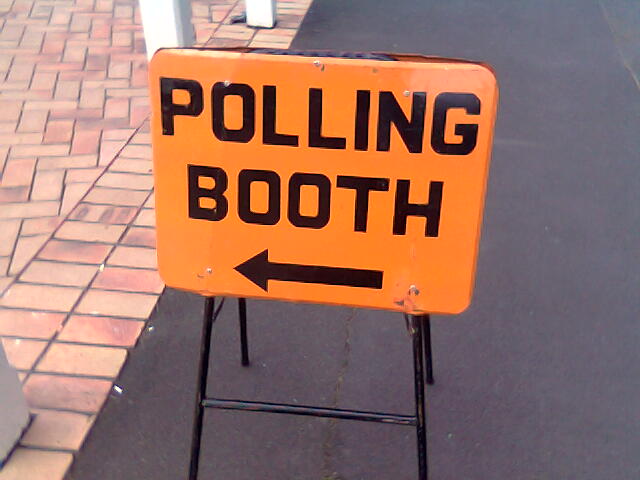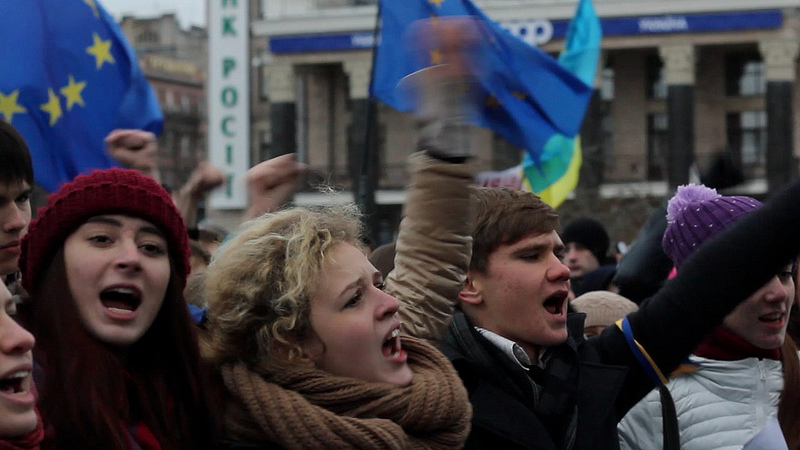Guest post by Brent Sasley
Last month Rose McDermott wrote an important piece in these pages arguing that some individuals (particularly men) are more likely to be interested in violence, based on their biological make-up, than most IR scholars think. This, she continues, is because we tend to focus on larger, macro structures and processes and so miss individual-level determinants of behavior. Her analysis isn’t wrong; it’s incomplete. As IR scholars, we want to know not why individuals act violently, but why large groups do. This is because national and international politics are affected only when groups, not individuals, act violently.
McDermott is right, but we still need to think more about what makes a collection of individuals fight, go to war, act violently. It may be that some individuals react more aggressively to others and to events, but if these individuals are not leaders of groups, including states, and cannot also get large numbers of other individuals to follow their orders to fight and kill, then their aggressive inclinations are less likely to manifest on a large scale.
One way to build on McDermott’s argument is by considering the effects of social emotions. Social identity theorists and social psychologists have found plenty of evidence that individuals will react to events or other actors that affect other members of their group. That is, when individuals identify as members of a group — when they feel as part of the group — they react when other group members are hurt, attacked, abused, victorious in sports, and so on — even if they have not personally experienced any of these actions. The perception isn’t that individuals absorb punishment or reward; it’s that the group does. Collective memories operate the same way.
Think of how people react to sports matches. It is common for individuals sitting in their homes and playing no role at all in their home team’s efforts to share in the pride or in the frustration when their team wins or loses, toasting “their” success or throwing items at the television. Other clinical experiments by social psychologists have shown that individuals who consider themselves part of different departments in the same university view themselves as part of different universities in the same country, or identify as citizens of different countries react emotionally on the basis of how they perceive their own group — that is, other group members — to have been affected by events.
Because emotions are so powerful, they lead group members to prefer a given response over others (an “action tendency” in psychology’s terms). In the aftermath of violence against the group, group members feel anger, resentment, and fear, which in turn have been found to transform into stereotyping, prejudice, aggression, and hostility. These emotions do not lead automatically to a given behavior or policy — such as violence or war — which can be conditioned by other factors (such as relative strength of different groups). But they do make a specific behavior or policy more likely.
Consider the widespread support in Crimea for the Russian intervention. It is not likely that all the Russians and Russian-speakers who are cheering Moscow’s suddenly-expanded military presence in Crimea have been physically or verbally attacked by others, so that they have been seething for years and hoping to be saved by Moscow. But their reaction — joy, pride, excitement, affection — is a direct result of their identification with a Russian communal identity (however they define it).
There haven’t been any large-scale clashes in Crimea yet, but one can easily imagine their occurrence on the basis of a relevant trigger. We can expect that Russian-speakers will respond with fear and anger if other Russian-speakers or their property are attacked in some way. Vladimir Putin’s dangerous escalation makes such triggers more likely. And if Russian-speakers attack, we can expect others in Crimea to respond, which in turn might bring the Ukrainian and Russian armies into a direct clash. Inter-group emotions make it that much easier for communities to physically confront each other, and that much harder to restrain.
Large-scale violence through the use of official state militaries is only a little different. Military discipline does mostly ensure that soldiers follow orders to engage in routine violence. But often there is more to it than that. For example, in his new book on Israel, Ari Shavit looks at the atrocities the Israelis committed in the Arab city of Lydda during the first Arab-Israeli war. His discussion highlights the individual fears, frustrations, anger, and hostility that individual Israeli troops felt regarding the war’s effects on the Zionist community and the nascent Jewish state. These emotional reactions played a critical role in their violence, leading to a massacre of Palestinians in the city and their expulsion from it.
McDermott is right that some individuals, including leaders, might be more willing to act violently. But without being able to motivate groups to follow along, individual-level violence will remain contained. Understanding the emotional reactions and action tendencies of many members of a group usefully extends her argument from just individuals to group violence, which is of concern to IR scholars and policymakers.
Brent E. Sasley is Associate Professor in the Department of Political Science at the University of Texas at Arlington and tweets at @besasley.






0 comments
When the author ends up with the Ukrainian army possibly fighting the Russian army then you know something is wrong. In reality, there is no real Ukrainian army and I doubt what rump group there is would actually obey orders to commit suicide. Also, “Putin´s dangerous escalation” is a joke. The escalation came from the West when they sponsored and supported mob rule in a coup overthrowing an elected president. And now they act surprised and appalled that Russia reacts as it has. True hypocrites all!
A word of advice. People do, on their own initiative, protest and demand authoritarian leaders leave. Pretending otherwise simply leaves you with a disastrously flawed understanding of the situation.
And it’s fascinating to see how many people have suddenly appeared to give these statements, most of whom I’ve never seen post before.
“on their own” – are you kidding? And are you telling me that, for instance, if all the right wingnuts assembled at the Washington Monument and demanded the removal of that (in their eyes!) dictator Obama that that would be all right? And if you don´t see the footprint of the CIA in the Ukraine then you might want to read the history of Allende´s Chile, Iran´s Mossadegh, Guatamala´s Guzman, Venezuela 2002, Afghanistan 2001, Somalia…. the list goes on and on. I assure you, it is you who fails to understand the situation. What would America do if the Russians backed a coup d´etat in Mexico and helped set up a new government there? EXACTLY what Putin is doing. Wake up. And that you try to insinuate that I´m some kind of troll because you haven´t seen me before is the kind of ad hominem attack I expect from someone with no other “ammunition”.
Events in the Ukraine, and the propaganda about them emanating from our mainstream media, have gotten people very excited, not always as intended by those media. It is an example of what the article is talking about, in fact. I too was somewhat irritated by the phrase ‘Putin’s dangerous escalation’ since I am pretty sure that Putin is responding — very rationally and carefully, I imagine, from his point of view — to events initiated by others. This is in fact another part of the system of group violence: if Putin wants to be the big dog in Russia, he has to be ready to lead the pack against the invader.
I am not sure about the other parties contesting Ukraine at present. Yanukovych and the Ukrainian parliament were, as far as I know, democratically and legally elected. Many people who are not fans of the present government in Washington might be upset if a mob, some of them violent, ran that government out and installed its own leaders. As in Yugoslavia, dissolution of the supposedly oppressive central government has not led to any sort of unity or common opinion as to what ought to replace it. In addition, it seems fairly obvious that many of the participants in recent events are working for non-Ukrainian powers and groups. I do not refer solely to those connected to the rulers of Russia.
To date I know of precisely nothing to suggest that any Western state had anyone involved in Ukrainian protests. The absolute most we’ve seen is a report intercepted and leaked by the Russians of American diplomats discussing the relative merits of several protest leaders. Amazing. That’s the stunning evidence that American diplomats discuss various major political figures of nations that they’re dealing with.
And I’m pretty sure that any situation where one nation forcibly takes part of another nation away is dangerous escalation, especially when there is little evidence that the justification for it was actually true*.
*Or do you intend to praise the invasion of Iraq? After all, at least Bush made no effort to break up the nation of Iraq.
And I stand by my analysis of Putin’s move. It would have been absurdly simple for him to use proxies to start street battles in Crimea or to simply bribe the new government with aid money to keep the ports open to the Russian fleet. He didn’t. He sent in soldiers to forcibly change a nation’s borders, he acted out of fear.
I´m afraid that the naivete and phony morality at the foundation of your obvious prejudice against Russia makes you a hopeless case. You say you “know of nothing to suggest Western involvement” and then go on to name what is in fact clearly a “suggestion” of Western involvement. (By the way, it is never until years later that these “involvements” become known!) Did you notice some of the niceties in the leaked tape? Like Vladamir Klitscho being referred to with the term of endearment “Klitsch” and the blasé way they discussed the NEXT LEADER. This was before it was in any way clear that Yanokovich was going anywhere! Ah, but they KNEW, and were already making plans. Then you go on to say “I’m pretty sure that any situation where one nation forcibly takes part of another nation away is dangerous escalation”. Oh, really? First of all, the whole history of nations is one of taking and losing territory (see Mexico and Texas for a nice example on the home front!). There is your naivete! and you trot that palaver out as a way to assert the (phony) high moral ground. Then you go on like the rest of the propaganda slinging media to talk about the “justification” not being true. Pulease! The “protecting our home people” is never taken seriously – it is a not very subtle code for “I´m protecting my nation´s interest”. Can you imagine that? What, in fact, is America´s interest in the Ukraine? And the Crimea has been part of Russia since 1856 and was only “given” to the Ukraine in 1954 by a drunk Ukrainian Kruschchev at a time when the Ukraine was itself part of the USSR. And it has been basically autonomous ever since and it is an EXTREMELY IMPORTANT area and port for the Russians. (Again, what is America´s interest there? – it certainly cannot be to expand democracy (the favorite BS “justification” of the US attacks on other nations) because Yanokovich was DEMOCRATICALLY ELECTED.). As I said before, you are just being a stooge for the US propaganda machine.
Forgive me if I sound moralizing or hypocritical or something of the sort, but things like this? They just make me walk away in disgust, particularly since I’m already rather suspicious of you and the fact that I don’t remember seeing many comments from you on this site before.
Brent,
Really interesting post. I agree emotions are important, and an under-theorized aspect of political violence and conflict writ large. Yet, I have several issues with how you frame the role of “group” emotions in conflict.
1) First, as a mechanism emotions are inherently at an individual level. They may aggregate up to group behavior, but focusing on “group” emotions obfuscates the fact that emotions are fundamentally individual phenomena.
2) Furthermore, the work of Jason Lyall and Chad Hazlett show that reactions to violence are not uniform, and that violence does not necessarily lead people to be increasingly motivated for conflict. By focusing on group-level responses, this post ignores the important heterogeneity that exist in responses to violence and commits an ecological fallacy (assuming that all group members respond to violence the same way). Emotions are not guaranteed to exacerbate conflict, in fact they may attenuate it.
3) Related to the point above, much of the most interesting behavior in intergroup conflict is the role of intragroup conflict/cohesion. The definition put forth here does not allow for emotions to influence intragroup conflict (all the emotions are directed toward the outgroup here). Much like the theoretical problems of realism/liberalism/ etc., there is no role for political conflict and emotions within the group/state, even though this is a major influence on intergroup conflict.
4) Finally, saying that states or groups have emotions–besides being theoretically problematic–does not explain the main strategic (political) calculus when we want explain when intergroup conflict occurs. Understanding when and how politicians strategically make ethnically charged emotional appeals to incite ethnic conflict for political gain is the more relevant question.
I think the author’s assessment here is correct, but I point out that we should also explore the relation between individual emotions and group emotions. At the end, it is the members of the elite who make the decision to go to war and rally the people to fight. The fact that Obama did not listen to those pushing for an airstrike against Syria demonstrates how complexity this relationship; therefore, it merits further research and discussion.
Reblogged this on The Eagle Eye and commented:
Interesting take on McDermott’s work.
Thanks, Thomas and Logicmancer, for your comments. I agree that we haven’t adequately addressed the tension between individuals as individual-level and as group-level phenomena. I begin to address this in my ISR piece (linked to above), and am working more on it (as are others).
I also don’t mean to suggest that emotions cannot be individual-level reactions–my EJIR piece makes that exact argument. I think it depends on the research question and the specific issue under examination. But I admit I do lean toward thinking of emotions as social and collective when my IR scholar hat is on.
What about states centered strongly around one personality? Or should we see those as ones where important groups are convinced that the leader embodies what they think, so there isn’t any daylight between what the leader does and what the group believes they all want?